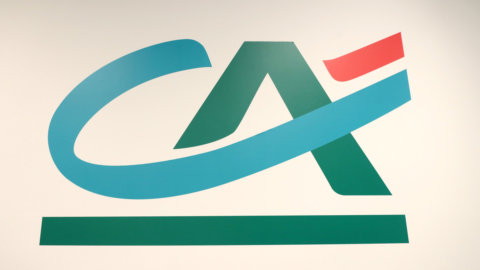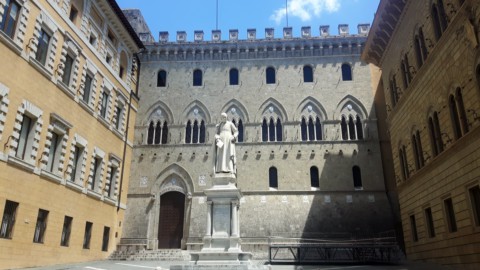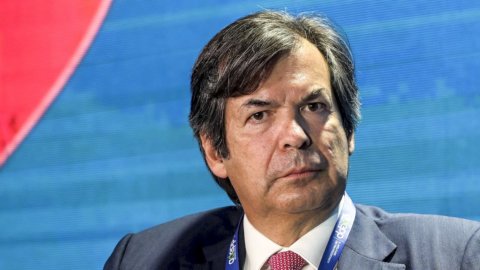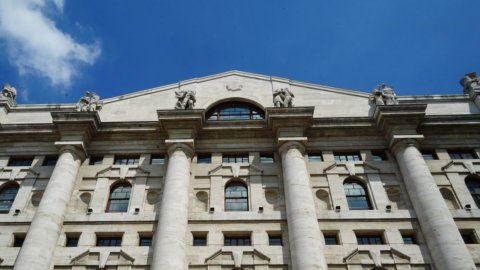This morning the markets are calculating the damage, particularly heavy in Europe. Asian price lists are cautious, the least affected also by the short break in Tokyo. The Shanghai composite index lost 0,1%, Hong Kong -0,3% on the wave of new losses by HSBC and Standard Chartered, both -2%. The Korean Kospi (-1,8%) and the Indian stock market index (-0,7%) lost hits.
Wall Street futures are little moved after yesterday's bad close: Dow Jones -1,84%, S&P -1,16%, Nasdaq -0,13%.
A mini-rebound is also looming on the European markets.
DOLLAR STRONGER AGAINST THE EURO, OIL RECOVERY
The dollar depreciates against the yuan, to 6,78. The dollar-yen cross, one of the best indicators of risk appetite in the markets, is at its lowest since March, at 104,5. The euro weakens against the dollar to 1,1764.
Brent oil is trading at $41,6 a barrel, up 0,3%. Yesterday North Sea oil lost 4%: there are those who are starting to look at the long holiday period in China which begins on October 2st, an activity shutdown that could further weaken demand from Chinese refineries, declining for weeks. Gold closed 1.912% down, this morning was flat at $XNUMX.
The second wave of the pandemic, increasingly aggressive, is holding the court. From today, those arriving in Italy from Paris will have to undergo a swab. In France, half of the departments are in the red zone. In October, Britain risks 50 infections a day.” We turned but in the wrong direction ”, commented the British head of Health. Increase in infections in Belgium (+64%).
POWELL: COMPANIES NEED FUNDS, NOT LOANS
Doubts are growing about the ability of governments and central banks to weather a second wave of infections. All eyes are on the Federal Reserve. “Companies need direct aid, not new loans”. So reads the memo that Fed Chairman Jerome Powell published a few hours after his speech to the House Financial Services Committee. The governor will admit that economic activity and employment "remain well below pre-pandemic levels" in a picture of improvement that remains "largely uncertain". Congress should move together with the White House, but bipartisan understanding is increasingly difficult. A dramatic duel is looming over the choice of the new judge of the Supreme Court, to replace the liberal Ruth Baden Ginsberg. Trump wants to proceed by Saturday, with the aim of closing the game before the November 3 vote, guaranteeing conservatives control of the supreme judiciary, however the election goes. Democrats hunt down Republicans who disobey the tycoon.
TODAY IS TESLA'S BATTERY DAY, BEZOS' BIG SHOOT IN BIOTECH
In this context, Wall Street awaits the performance of Elon Musk who today, in addition to presenting Tesla's accounts, will lead the Battery Day in which he will present the tycoon's new energy solutions.
In healthcare, another big deal has arrived. The biotech group Illumina has announced an 8 billion dollar acquisition in the field of rapid cancer diagnosis. The stock closed down 9%. The Californian genomics company has taken over the entire capital of Grail, a start-up founded five years ago by Illumina itself in which Jeff Bezos and Bill Gates have also put their personal money.
EUROPE SUFFERS THE MOST. ONE SCOOP SINK HSBC
The hurricane hit the European markets with particular violence, under the pressure of the epidemic but also of Brexit, which is ever closer. In addition, there has been an echo of the revelations about the "suspected illegal activities" of the big banks made by the International Consortium of Investigative Journalists. These are operations of the past but which, in a fragile context, have resulted in an avalanche of sales on securities that were once solid as rocks: HSBC, already the most robust bank on the planet, plummets to its lowest level for a quarter of a century. No less disturbing are the signals coming from the US markets, now hit by the electoral campaign, and from the oil side, once again in retreat in the face of falling consumption. The increase in infections coincided with a sharp drop in risk appetite.
BUSINESS PLACE -3,75%, INDIFFERENT TO THE VOTE
The landslide obviously also affected Piazza Affari: -3,75%, below 19 points (18.793), in line with Paris, worse than Madrid and London (-3,45%). The markets have not registered reactions to the Italian vote.
The worst place was Frankfurt (-4,5%), as usual the most sensitive to threats to international trade.
LAGARDE ADMITS: VERY UNCERTAIN RECOVERY
The president of the ECB Christine Lagarde has corrected the optimism expressed a few days ago on the occasion of the directorate of the central bank. “The economic recovery – she said – remains very uncertain, uneven and incomplete and still needs support. It continues to depend to a large extent on the future evolution of the pandemic and the success of the containment measures".
BUND RACE, AT THE MINIMUM FOR ONE MONTH. BTP A 0,92%
Government bonds are also appreciating: the yield on the German Bund reaches its lowest level in the last four weeks, -0,52%. The Btp is also appreciating, after a slow start: the 0,92-year yield falls to 0,80%, ever closer to the record low of 146%. The Btp/Bund spread marks XNUMX points.
The 40 blue chips of the FtseMib are all in deep red, with the exception of Diasorin (+1,1%). The risk of a significant bearish breakout is serious.
ONLY DIASORIN ADVANCES, CNH THE WORST
The worst stock was Cnh Industrial (-8,05%) which paid for the news of the resignation of the CEO of Nikola, the start-up of which Cnh is a major shareholder. Pirelli is also in deep red (-5,1%). Holds Prysmian (-0,94%): Mediobanca Securities confirmed its outperform rating, with a target price of 25,2 euro per share.
Heavy oil: Saipem -7,44%, Eni -5,93% (including the detachment of the coupon), Tenaris -6,56%.
THE UNKNOWN MONTEPASCHI ON UNICREDIT AND BPM
The banks suffer. The worst were Unicredit (-6,17%) and Banco Bpm for a "merger" with Mps: Mustier has already made it known that he is only available for "absolutely neutral" transactions, i.e. that do not cost a single euro. The 8,1 billion Gacs credits are not enough. Failure to sell Mps risks putting the Italian banking system in great difficulty within the EU. The sales hit other financial stocks such as Banca Mediolanum (-6,53%) and Unipol (-5,37%). Among the major declines are Leonardo (-6,73%) and Atlantia (-6,39%).





